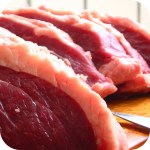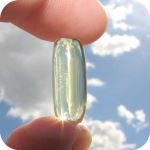Some foods are just bad for you, but did you know that there are also certain foods that can harm your chances of getting pregnant in the first place? As well as these foods, there’s a whole list of other foods which you are advised to avoid altogether when you are pregnant as these have been found to potentially harm the developing baby. Sound confusing? Well, it doesn’t have to be. I always advise women that when you’re trying for a baby, you should eat as if you are already pregnant. After all, you may not know you’re pregnant in those important first few weeks of the baby’s development. Generally, as long as you’re eating a balanced diet you are likely to be doing the right things, but I’ve put together a list of certain foods and food groups to watch out for.

Large Quantities of Red Meat
A diet containing too much red meat can cause raised levels of ammonia in your body. This is a problem if you want to get pregnant because high levels of ammonia affect the implantation of embryos. And this could prevent you getting pregnant or cause an early miscarriage.
There has also been research to suggest that getting too much of your protein intake from animal sources can be detrimental. Studies have shown that there is an increased risk of anovulation (failure to ovulate) when the majority of a woman’s protein intake is from animal sources as opposed to vegetable sources. This doesn’t mean that you should exclude red meat from your diet entirely. After all it is a good source of protein and iron, which are beneficial for conception. But if you limit the amount of red meat you consume to 2-3 portions per week, you should reap the benefits, while reducing the drawbacks.
Instead, try to replace one or two portions of meat per week with alternative sources of protein such as fish, beans, eggs, quinoa and peas. The sharp eyed among you may have noticed in that last sentence, I included fish as an alternative to meat. While fish is meat, it’s a different kind of meat. And you should be eating plenty of fish for the oily omega 3, which is good for your health and fertility.

Hormone Enhanced Meat
Some countries allow growth hormones to be given to the animals they farm. These hormones increase the amount of meat on the animals. This in turn allows the farmers to pocket more money from each animal and consumers get cheaper meat. So, everyone wins, right? Not exactly.
As I said earlier, not every country allows this practice. This is because it is controversial. Some scientists think it is okay to eat hormone treated meat. Other scientists believe that it could be harmful to us. So, what are this latter group of scientists worried about?
It is well known that the long-term side effects of receiving growth hormone include joint problems, fluid retention, muscle pains, and an increased risk of heart disease and cancer. Not a problem if you’re destined for the slaughterhouse and won’t live long enough for any of these problems to manifest. But is eating meat treated with hormones going to give you the same problems?
The growth hormones do survive cooking, so you will consume them if you eat hormone treated meat. However, the cattle are injected with the hormone, they aren’t fed them. So, the disagreement between scientists is whether eating these hormones will cause the same long-term problems as having them injected. Since it’s not been proved definitively either way, some countries ban hormone enhanced meat, while others choose to allow it.
How does this relate to fertility? Well, studies show that the foreign hormones used in animal farming could affect your own hormone balance. And because your fertility is regulated by your hormones, messing with them is going to have detrimental effects on your fertility.
Now I don’t know about you, but I tend towards the path that leads to the least likely chance of me harming myself and my fertility. And in this case, it is avoiding meat that has been treated with hormones until it has been definitively proved to be harmless.
Instead, I look for organic meats. These do not contain extra hormones and therefore are a healthier alternative. And while they may be more expensive than non-organic meat, they are nowhere near as expensive as having to have fertility treatment.
As of writing this, the main countries that allow growth hormone treated meat to be consumed by humans are: The United States, Canada, Australia, New Zealand, South Africa, Mexico, Chile, and Japan. Don’t take this list as gospel. Times change: new scientific evidence is found, trade deals alter local practices, deregulation can occur. Because of this, that list could grow or shrink. So do an internet search to see if your country allows consumers to buy hormone treated meat or not.

Fish Contaminated with Mercury
Fish is a great source of protein and omega 3 fatty acids. However, you need to be careful about the types of fish that you are eating as certain varieties contain high levels of mercury. This is difficult for the body to get rid of, and so levels can rise and also remain in the body for up to a year after consumption. Mercury can cause fertility problems, and also affect the developing baby’s brain and nervous system.
The fish with the highest levels of mercury include Marlin, swordfish, ahi and bigeye tuna, tilefish, shark and king mackerel, so these should be avoided altogether where possible.
The fish with the lowest level of mercury and therefore safe to eat, include salmon, mackerel, haddock, herring, crab, sole, scallops, whitefish and sardines.
Pregnant women have previously been advised against eating raw fish. This is because of the risk of food poisoning. The recommendation is now that it is usually safe to eat sushi and foods containing raw fish, but to be careful that certain fish has been frozen first. This is to ensure that any parasites and bacteria have been killed off during the freezing period. The main culprit for this is salmon, so ensure that it has been frozen prior to eating it raw or in sushi. Smoked salmon is fine as the smoking process will have killed any contaminating organisms. Shellfish is also safe to eat, as long as it has been properly cooked.

Trans-Fats and Your Fertility
Trans-fats are also known as trans fatty acids, or hydrogenated fats. They are a type of unsaturated fat, which are mainly found in industrially produced foods, such as vegetable oils, margarine and fast foods. They are also found in “low fat” products, along with other sugars and sweeteners which have been added to improve the taste. They are known to increase your risk of heart disease if consumed in significant quantities.
Studies have shown that women who eat a lot of food containing these trans-fats take longer to conceive than those whose diet is low in trans-fats.
Try to avoid too many processed foods, and also steer clear of foods which are marketed as “low fat”. Try to replace these fats with more healthy, natural fats, such as those found in olive oil, avocados and nuts.

Refined Carbohydrates and Your Fertility
Refined carbohydrates are carbohydrates which have been processed. As a result of this processing, a lot of the nutrients and the fibres are removed from the carbohydrates. Like all carbohydrates, they are broken down by the body into sugars, but with refined carbohydrates this process occurs quicker. This results in a surge of sugar levels in your blood not long after eating. With unrefined carbohydrates this sugar surge is lower and more spread out over time.
The problem with these sugar spikes are that they cause insulin to be released by the pancreas. If these surges happen frequently, this insulin can cause excess testosterone production. This will affect the other reproductive hormones, and can cause problems with ovulation. These sugar spikes are a particular problem if you have a condition called PCOS, as your levels of testosterone are already higher and you may have problems with insulin resistance.
Foods which contain refined carbohydrates include white bread, rice and pasta (whole grain or wholemeal varieties of these are not refined and therefore okay to eat), and snack foods such as biscuits, cakes, crisps etc.

Non-Organic Fruit and Vegetables
Non-organic fruit and vegetables are often grown with the assistance of chemical fertilisers and pesticides. These can contaminate the fruit and vegetables, and are absorbed when you consume them, even if they are washed thoroughly prior to eating. These chemicals can cause menstrual disorders, including endometriosis, increased risk of miscarriage and birth defects.
However, not all fruit and vegetables need to be organic in order to avoid pesticides. Generally, if the fruit or vegetable is protected by an inedible skin or peel, then the pesticide is unlikely to be a problem. These fruit and vegetables include avocados, cantaloupe melons and watermelons, aubergines, onions, pineapples and sweetcorn.

Listeria Carrier Foods
Listeria are bacteria found in certain foods. If you become infected with these bacteria you can develop an illness called listeriosis. This is of particular relevance if you are pregnant as it can cause miscarriages. Pregnant women are also more likely to get listeriosis than women who are not pregnant if they eat contaminated food. This makes it a good idea to avoid the culprit foods when trying for a baby as well.
The foods which can contain listeria are the soft, ripened cheeses, such as Brie and Camembert, blue veined cheeses, such as Stilton and Danish Blue, unpasteurized milk and other dairy products, and pates.

Vitamin A Rich Foods
Vitamin A rich foods are also a no-no when you are pregnant or trying to conceive. Too much vitamin A can cause problems with the baby’s eye development. This is probably not going to be too much of a problem, as vitamin A is found in foods which you are not likely to be eating in large quantities on a regular basis.
Vitamin A rich food include haggis and liver.
Caffeine and Your Fertility
There is a lot of conflicting advice regarding your caffeine intake when trying to conceive. Some doctors advise avoiding it altogether, and other doctors are a bit more pragmatic and advise that as long as you’re not overdoing it, you’re unlikely to be affecting your fertility. I tend to lean on the side of pragmatism: enjoy a daily cup of coffee and don’t panic that it will be preventing you from getting pregnant.
It is not known how caffeine may affect fertility directly, but some studies have shown a link between the amount of caffeine consumed and your ability to conceive. When you are pregnant though, it has been shown that too much caffeine can cause early miscarriage and babies to be born with a low birth weight.

The general recommendation is that as long as you are consuming less than 200 – 300mg a day, you’re fine. This equates to about 2 cups of instant coffee per day. However, it quickly becomes a bit confusing as caffeine is also found in tea, chocolate, energy drinks and fizzy drinks including cola. The amount of caffeine in coffee also varies according to where and how the coffee is made, and obviously the size of your coffee cup. The really frustrating thing is that even decaffeinated tea and coffee contain caffeine, albeit in a lower dose than the caffeinated variety. I personally wouldn’t worry about slight differences in different drinks and products, but if you want to know how much caffeine is in different products, this link has a detailed list. (http://www.caffeineinformer.com/the-caffeine-database).
Also, if you consume a lot of caffeine on a regular basis, beware stopping suddenly. This can leave you feeling awful with headaches, tiredness, irritability, muscle pains and nausea. I would know, having personally suffered from them when I came off nights at A&E back when I was a junior doctor. These symptoms kick in within a few hours of missing your normal caffeine hit and can last a day or so. I’d therefore advise that instead of going cold turkey, gradually cut down your caffeine intake if you feel that you are consuming a bit too much.

Alcohol and Your Fertility
Alcohol can harm your fertility by altering your hormone balance and reducing egg quality, and this can occur with even small amounts. You are also strongly advised to avoid alcohol altogether when pregnant due to the detrimental effects upon the developing baby. This topic is so important that it has its own dedicated page: Alcohol: An Honest Guide to Drinking When Trying for a Baby
Links to Popular Related Pages





